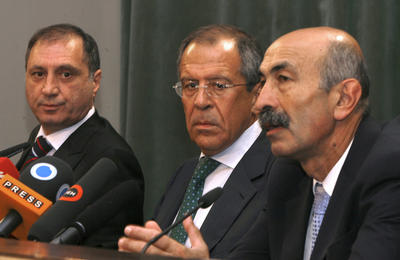This time a different cast is at play, revolving around the little-known republic of Abkhazia and alleged Russian financial inducements to win recognition for Abkhazia’s secession from Georgia.
In feuding with Georgia, Russia is campaigning for international recognition of breakaway republics it supports (apart from Abkhazia, South Ossetia is another). But things are not going well for Russia. Nearly the entire international community is refraining from recognising these breakaways, and only a small handful have established relations so far — Nicaragua, Venezuela and Nauru.
Nauru, of course, is no stranger to this cash-for-diplomatic recognition game, having already earned a reputation in the earlier China–Taiwan tussle. In scenes reminiscent of those heady days, Nauru Foreign Minister Kieran Keke was courted by Moscow in 2009 with visits to the South Ossetian capital Tskhinvali and an audience with Russian Foreign Minister Sergei Lavrov. Following these visits, a Russian assistance package of US$50 million was announced and, in December 2009, Nauru established diplomatic relations with South Ossetia and Abkhazia.
If the courtship of Nauru seemed uneventful, Moscow’s recent dalliance with Vanuatu proved more controversial. Embroiled in the complexities of elite politics in Vanuatu, Moscow’s fortunes rose and fell as a period of intense political turmoil played itself out from December 2010 to June 2011. The premiership of Vanuatu changed hands no less than five times during this period and, on each change, the recognition of Abkhazia was either on the cards or off. Indicative of the stakes involved preceding Sato Kilman’s eventual elevation as Prime Minister in June, a massive media campaign was run in Vanuatu with full-page newspaper advertisements clamouring for the recognition of Abkhazia. At time of writing, the official word is Abkhazia is yet to be formally recognised, though according to the Foreign Ministry Vanuatu is ‘working towards it’.
This may not be all the government is working towards. Building on the momentum of the Russian deal, Vanuatu appears to be enshrining such swaps as a business model. In dangerous moves potentially reviving the old China–Taiwan rivalry, Vanuatu’s Foreign Minister Alfred Carlot dispatched a letter to Chinese Ambassador Cheng Shuping in July demanding the Chinese government provide US$32 million in return for Vanuatu’s support in the UN. Upping the ante, Minister Carlot announced several days later his intention to visit Taipei shortly, and eventually open a trade development office to foster closer Vanuatu–Taiwan ties.
This apparent return of check-book diplomacy in the Pacific is disturbing. Such practices can prove inherently destabilising and corrosive of governance, instilling corruption and an arbitrariness in policymaking. Of wider import, in stirring already troubled political waters in many nations, such practices may throw an added dimension of uncertainty into relationships between Pacific nations, exacerbating difficulties in advancing the project of Pacific regionalism.
Addressing such practices will be no easy task. What is at root here is more than the rapacious behaviour of a handful of corrupt politicians and officials, or the shenanigans of unscrupulous suitors. There are deep structural drivers feeding the predilection of some Pacific nations to engage in this game. Unless and until these factors are addressed a repeat of these events is likely, with damaging consequences to follow.
Many Pacific island nations face extremely daunting economic prospects with governments struggling to generate sufficient revenues off very small economic bases to sustain expenditure over an expanding range of needs and priorities. Traditionally, gaps have been filled by development assistance from donors. While welcome and extremely significant, Pacific island nations have often made it known that such assistance suffers several shortcomings. Much, for instance, remains project-based and of finite scope and duration. Strict conditions are often attached, leading to the oft-heard complaint that assistance may be more in the interest of the donor than recipient. And, sizable as these flows are for island nations, there is never enough.
In this context, the relative ease with which funds may be obtained by simply selling diplomatic recognition must seem attractive. Indeed, to the extent rival suitors may be played off against each other for this is all the more lucrative and compelling.
Efforts to encourage Pacific nations away from this path must pay heed to this predicament. Controversial questions will have to be considered, addressing the economic fundamentals of these fragile nations, their tenability, the size and structure of government they may realistically support, the aspirations and expectations of their citizenry, and the role of the international donor community. What, for example, might a truly sober and realistic assessment of the future economic viability of these nations say? Given many Pacific nations small economic base, is there a case for examining the ‘right-sizing’ of government? How might citizens’ expectations be managed and their rights protected? And is there a need for the donor community to re-assess its approach to assistance in these island states, nuancing modalities and coordination to better address recipient states’ concerns?
These are difficult questions requiring frank discussion and action. Perhaps when inroads are made on these we may more confidently lay to rest the spectre of check-book diplomacy. But until such a time, the risk remains.
Alfred Oehlers is a professor at the Asia-Pacific Center for Security Studies, Honolulu.


Having been deeply involved in the negotiations with Vanuatu, I can confirm that the main architect of Vanuatu’s recognition of Georgia, was an old friend of our country, and Vanuatu’s Special Envoy Shiv Shankaran Nair. Mr.Nair who was at one time Advisor to the late President of Nauru, Bernard Dowiyogo, spent several years in Georgia, in the late 90s. He was the owner of one of the largest insurance companies in Georgia, BCI, which he sold to the Bank of Georgia. Mr.Nair was appointed as personal envoy by Edward Natapei the foreign minister of Vanuatu with a specific remit to negotiate re-recognition of Georgia. Mr.Nair fulfilled his remit, using the channel of Ambassador Nikoloz Natbiladze, Georgia’s ambassador to Spain as his counterpart.